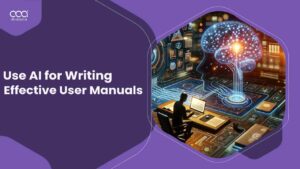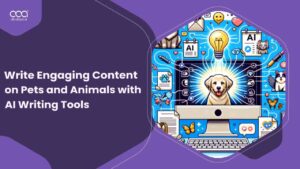In the constantly evolving world of storytelling, integrating AI writing tools represents a significant breakthrough, especially in the adventure genre.
These tools not only augment the traditional narrative process but also introduce an array of innovative techniques that can transform the way adventure stories are conceptualized and written.
In this guide, I will discuss how to write captivating adventure stories with AI writing tools in India in detail. This guide will be structured as a step-by-step tutorial, delving into every aspect you need to know about leveraging AI for creative storytelling in this genre.
Step-by-Step Guide: How to Write Captivating Adventure Stories with AI Writing Tools in India.
Writing an adventure story using best AI writing tools in India involves creativity and technological assistance. Here’s a step-by-step guide of how to write captivating adventure stories with AI writing tools in India :

Step 1: Establishing the Foundation
Idea Generation: Start by using AI tools for brainstorming ideas. Tools like OpenAI’s Chatgpt can suggest unique themes, settings, and character archetypes based on adventure genre trends and data.
Setting and Era Selection: AI can assist in choosing an intriguing setting and time period. It can also analyze historical data and geographical information for authenticity and inspiration.
Step 2: Developing Characters
Character Profiles: Utilize AI to plan detailed character profiles. Tools like CharacterAI can suggest complex backstories, personality traits, and motivations.
Dynamic Relationships: AI can propose relationships and interactions between characters, adding depth to their development.
Step 3: Crafting the Plot
Plot Outlining: Use AI to structure your plot. Tools like Plottr or AI-based storyboarding software can help you outline the main events and turning points.
Conflict and Resolution: AI tools can suggest various conflict scenarios and resolutions, ensuring your story remains engaging and unpredictable.
Step 4: Building the World
Detailed Environments: AI can assist in creating rich, immersive worlds. It can provide descriptions of landscapes, cities, or futuristic settings inspired by a mix of real-world data and imaginative elements.
Cultural and Historical Accuracy: For stories set in real-world locations or historical periods, AI can ensure cultural and historical accuracy, enriching the narrative’s authenticity.
Step 5: Writing the Draft
Narrative Assistance: AI writing assistants like Sudowrite or ShortlyAI can help in fleshing out scenes, dialogues, and descriptions.
Overcoming Writer’s Block: When stuck, prompt AI tools with your last written paragraph to generate continuations or alternative directions for your story.
Step 6: Refining and Editing
Grammar and Style Checks: Tools like Grammarly or ProWritingAid can analyze your text for grammatical errors and stylistic improvements.
Consistency Check: AI can scan the entire manuscript to ensure consistency in character details, plot points, and world-building elements.
Step 7: Getting Feedback
Beta Reading AI Tools: Use AI beta readers like Authors.ai to get initial feedback on your story structure, pacing, and character development.
Emotional Arc Analysis: Some AI tools can analyze the emotional journey of your characters and the narrative’s overall impact, offering insights for further refinement.
Step 8: Finalizing the Story
Title and Synopsis Generation: Use AI to craft a compelling title and synopsis that captures the essence of your adventure story.
Cover Design Assistance: AI tools like Canvas AI-based design suggestions can help create an eye-catching book cover.
Step 9: Publishing and Marketing
Market Analysis: AI can analyze current market trends to suggest the best time and platforms for publishing your adventure story.
Marketing Strategies: Utilize AI-driven marketing tools to identify target audiences and create effective marketing campaigns.
What Are the Essential Elements of an Adventure Story?
Adventure stories revolve around dynamic characters, an engaging plot, and an evocative setting.

- The characters are usually defined by their bravery, intelligence, and resilience in facing daunting challenges.
- The plot typically involves a journey or quest brimming with conflict and intrigue.
- The setting, whether a real-world locale or a fantastical universe, provides a canvas that brings the story to life.
Detailed Description of Essential Elements
Let’s explore in detail all the important elements that should be in an adventure story, which can turn your story into a masterpiece.
Heroic Protagonist: This character is often at the story’s heart, exhibiting courage, cleverness, and a willingness to face risks. Their journey forms the backbone of the narrative.
Engaging Plot: Central to an adventure story, the plot often involves a quest filled with challenges, mysteries, and escalating events that captivate the reader.
Vivid Setting: The story’s backdrop, ranging from uncharted jungles to alien planets, plays a critical role in setting the tone and influencing the plot’s progression.
Dynamic Conflict: Conflicts, whether internal, interpersonal, or against larger forces, drive the story forward, providing tension and resolution.
Rich Theming: Themes like good vs. evil, self-discovery, and adventure itself add depth and layers of meaning to the story, making it resonate with readers on a deeper level.
Importance of Each Element in Storytelling
The protagonist connects the audience to the narrative, making their character development crucial.
The plot provides structure and pacing, keeping the audience engaged. The setting enriches the story, adding layers of context.
Conflicts introduce tension and are pivotal in the progression of the plot. The themes offer a deeper understanding and connection to the narrative, elevating it beyond mere entertainment.
How AI Writing Tools Enhance Adventure Story Writing
Now that you know how to write captivating adventure stories with AI writing tools in India, let’s look at their advantages. AI writing tools, equipped with advanced algorithms, bring a new dimension to storytelling.
They analyze vast amounts of text and literary patterns to generate creative narrative elements, such as plot twists, character arcs, and dynamic dialogues.
These tools aid writers in developing intricate plots and rich characters, offering alternatives and enhancements that might not be immediately apparent.
Unique Features of AI Writing Tools
Innovative Idea Generation: AI tools can suggest novel and creative ideas for plots and characters, often deriving inspiration from a wide array of sources.
Language and Style Enhancement: They can improve narrative expression, helping to craft more vivid and engaging dialogues and descriptions.
Structured Plot Development: Machine learning assists in creating well-paced and logically coherent story arcs, essential for maintaining narrative tension.
Rich Character Building: These tools can provide insights for deeper and more nuanced character development, adding complexity to the protagonists and other characters.
Narrative Consistency: AI tools ensure the story remains consistent, especially in plot details and character traits.
How to Use AI Writing Tools for Creating Adventure Stories
Now that we have understood how to write captivating adventure stories with AI writing tools in India let’s explore the step-by-step process for story creation.

Step-by-Step Guide for Story Creation
Foundation Setting: Input the basic elements like genre, primary plot, and character outlines into the AI tool. This gives the AI a framework to generate relevant suggestions.
Idea Expansion: Utilize the tool to explore plot possibilities, character developments, and setting details, expanding on the initial ideas.
Narrative Refinement: Refine the AI-generated ideas by adding personal touches, ensuring the story aligns with your vision and style.
Editing and Polishing: Employ the AI tool for grammar checks, style enhancements, and ensuring narrative consistency, polishing the draft into a coherent story.
Finalization: Review the AI-enhanced story, combining the tool’s insights with human creativity and judgment to finalize the narrative.
Detailed Explanation of All Steps
Let’s delve into the detailed process of how to create enthralling adventure stories using the best AI Writing tools , examining each step closely to understand how these advanced technologies can enhance and transform the art of storytelling.
Define Basic Story Elements: Begin by setting the stage for your story in the AI tool, specifying elements like the setting, character profiles, and basic plot structure.
Expand Ideas Using AI: Leverage the AI’s capability to generate creative plot and character ideas, using these suggestions to enrich and diversify your story.
Personalize AI Suggestions: Take the AI-generated content and infuse it with personal creativity and narrative style, ensuring the story reflects your unique voice.
Edit with AI Assistance: Use AI tools for technical and stylistic edits, improving the readability and flow of the story.
Finalize the Narrative: Combine your creative insights with the AI’s contributions to craft a polished and compelling adventure story.
What Makes AI-Generated Adventure Stories Unique and Engaging?
AI-generated adventure stories stand out due to their innovative integration of advanced technology and creative storytelling.
These narratives are characterized by their unique blend of diverse perspectives, intricate plot developments, and rich, immersive world-building, offering readers a captivating and distinct experience.
Unprecedented Creativity and Innovation: AI-generated adventure stories showcase a remarkable fusion of creativity and innovation, with AI tools adeptly combining diverse narrative structures and styles. This leads to unique story elements that break away from traditional human storytelling norms.
Diversity of Perspectives and Ideas: AI transcends personal and cultural limitations, drawing from a vast array of global narratives. This results in a richer, more varied range of perspectives and ideas, enriching the storytelling experience.
Complexity in Plot Development: AI’s ability to handle complex narrative threads allows for the crafting of intricate and coherent plot developments. These multi-layered storylines, more intricate than typical adventure tales, captivate readers with their depth and engagement.
Enhanced World-Building Capabilities: AI excels in creating detailed and imaginative worlds for storytelling. By integrating diverse information, AI constructs rich, vivid settings that enhance the narrative’s depth and consistency.
Dynamic Character Development: AI introduces characters with unexpected traits and development arcs, moving beyond conventional archetypes. Leveraging data from a wide spectrum of literature, artificial intelligence (AI) suggests nuanced characters, making the narrative more engaging and relatable.
What Are the Benefits of AI-Generated Adventure Stories?
Now that we have explored the story creation process of writing captivating adventure stories using AI writing tools, let’s find out the benefits of AI in storytelling.

- Diverse Perspectives: AI can bring in various cultural and thematic elements, enriching the narrative with diverse viewpoints.
- Creative Exploration: It facilitates the exploration of uncharted plotlines and character developments, pushing the boundaries of traditional storytelling.
- Efficient Story Development: AI tools can speed up the brainstorming and drafting process, making story development more efficient.
- Enhanced Language Quality: They can improve the linguistic quality of the narrative, crafting engaging and well-articulated dialogues and descriptions.
- Educational Value: AI can integrate educational content into stories, making them informative while still being entertaining.
Educational and Entertainment Value
AI-generated stories offer a unique blend of education and entertainment, presenting narratives that are not only captivating but also informative, often weaving in historical, scientific, or cultural facts.
- Enhanced Learning Experience
AI-generated stories integrate educational content into engaging narratives, offering an interactive and immersive learning experience by including historical, scientific, and cultural facts.
- Multidimensional Storytelling
Combining educational material with storytelling, AI creates multidimensional narratives that entertain while educating, allowing readers to enjoy a story and learn about diverse subjects simultaneously.
- Customized Educational Content
AI’s ability to personalize storytelling caters to individual readers’ age, interests, and educational needs, making the learning experience both relevant and effective.
- Interactive Learning Elements
AI enhances storytelling with interactive elements like quizzes and puzzles rooted in the narrative’s educational content, thereby increasing engagement and reinforcing learning.
- Diverse Cultural Perspectives
By drawing from a global pool of narratives, AI-enriched storytelling introduces readers to a plethora of cultural perspectives, enhancing cultural awareness and understanding.
How Do AI Writing Tools Compare to Traditional Storytelling Methods
AI writing tools offer a novel approach compared to traditional storytelling, characterized by their ability to process vast amounts of data and generate creative content.
However, they lack the emotional depth and nuanced understanding that human storytellers bring to their narratives.
Key Differences
- Idea Generation: AI provides varied and unexpected ideas based on data analysis, unlike the intuitive, experience-based creativity of human writers.
- Efficiency in Drafting: AI tools can significantly speed up the drafting process, assisting in quicker narrative development.
- Style Variation: These tools can offer a range of linguistic styles and tones, providing diversity in narrative voice.
- Data-Driven Insights: AI utilizes literary databases to offer narrative development suggestions, particularly useful in plot construction and character development.
- Complementary Creativity: AI acts as an assistant to human creativity, augmenting rather than replacing the storytelling process.
What Future Developments Can We Expect in AI-powered Storytelling?
Knowing how to write captivating adventure stories with AI writing tools in India is great in the present, but what about the future?
As we look toward the future, the landscape of AI-powered storytelling is poised for significant advancements and transformations.
The continuous evolution of AI technology is set to revolutionize further how stories are created, shared, and experienced.
Future Advancements in AI Writing Tools
In the coming years, we can anticipate AI writing tools to become more sophisticated, intuitive, and collaborative. These advancements are likely to include;
Enhanced Natural Language Processing (NLP): AI will become more adept at understanding and replicating human emotions, humor, and subtleties in language through Natural Language Processing (NLP), leading to narratives that are increasingly indistinguishable from those written by humans.
Greater Customization and Personalization: Future AI tools may offer enhanced customization options, allowing writers to fine-tune the AI’s creative output to align closely with their personal style and narrative goals.
Interactive and Dynamic Story Creation: We may see the rise of AI tools that enable real-time story development, where the narrative can evolve based on reader feedback or changing world events.
Augmented Reality (AR) and Virtual Reality (VR) Integration: AI could play a pivotal role in creating immersive Augmented Reality (AR) and Virtual Reality (VR) storytelling experiences, blending traditional narrative with interactive, multi-sensory environments.
AI’s Potential Impact on the Storytelling Industry
The advancements in AI-powered storytelling are set to have a profound impact on the industry. Here are some of the ways in which AI will impact the storytelling industry.

Democratization of Storytelling: As advanced AI tools become more accessible, storytelling will become democratized. More individuals, regardless of their traditional writing skills, will be able to craft and share their narratives.
New Forms of Interactive and Immersive Storytelling: The integration of AI with AR and VR technologies will give rise to new storytelling formats that are more interactive and immersive, potentially expanding the audience base.
Enhanced Creative Collaboration: AI will not replace human storytellers but will serve as a powerful collaborative tool, augmenting human creativity and opening up new creative possibilities.
Shift in Audience Expectations: As audiences become accustomed to AI-enhanced narratives, their expectations regarding the complexity, personalization, and interactivity of stories will likely evolve, pushing storytellers to adopt new techniques and technologies.
FAQs
Can I use AI to write a story?
How does AI generate stories?
Will AI replace storywriters?
Can AI write a whole novel?
Conclusion
AI writing tools offer a promising avenue for enhancing the adventure story writing process. They provide efficiency, innovation, and assistance, but the soul of a story still relies heavily on human touch and experience.
Knowing how to write captivating adventure stories with AI writing tools in India is just the beginning. Don’t confine your creativity to just this genre. Broaden your horizons by delving into various writing styles and genres in the how-to guides of allaboutai.com.
Additionally, enrich your understanding of AI by exploring various terminologies, concepts, and definitions in our AI glossary.





